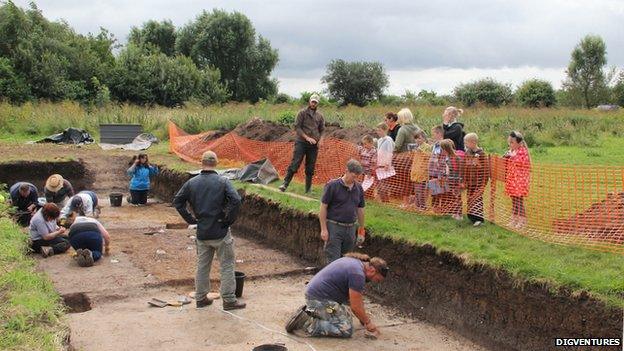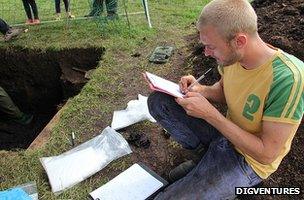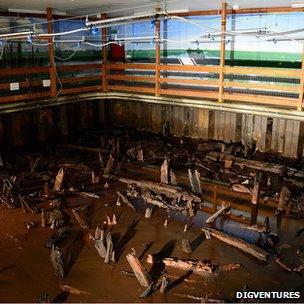Flag Fen hosts 'crowdsourced' Bronze Age archaeology dig
- Published

Some 80 members of the public have come to help the excavation, and many more have come to observe
A first-of-its-kind "crowdsourced and crowdfunded" archaeological dig at Cambridgeshire's Flag Fen has finished.
It is the site of a Bronze-Age "causeway" of millions of preserved timbers that are rotting away as groundwater recedes from the site.
The not-for-profit Digventures team raised £27,000 from members of the public who then joined in an expert-led dig to excavate parts of the site.
Flag Fen's discoverer Francis Pryor called it "terrifically rewarding".
Excavations of the site shortly after its discovery in 1982 barely scratched the archaeological surface at the site, which stretches across more than a kilometre of fenland.

Little in terms of digging happened since then, simply for lack of funds, and even now archaeologists do not know exactly why the enormous causeway was built.
The concern is that the wood, which has been preserved for 3,000 years by the watery fenland ground, may now be endangered because the drainage scheme for eastern Peterborough is funnelling water away from the site. Once the timbers dry out, they will simply turn to dust.
"We don't know what its secrets are yet," Dr Pryor told BBC News. "So we have got to come up with a novel, modern method for funding an excavation, and the obvious answer must lie in the internet."
Storytelling
The concept of "crowdfunding" - making an appeal for money from interested members of the public - has already made tremendous waves, with particular successes on the website Kickstarter.
Recently, a science-focused implementation of the same idea, called Petri Dish, has also shown how the public are willing to plough their own funds into research efforts they believe in.
Jason Palmer reports from the dig at Flag Fen
But the team behind the Flag Fen dig, known as Digventures, believe that archaeology is well-placed also to implement "crowdsourcing" - bringing in not just funding but also labour.
"We've seen that crowdfunding and crowdsourcing have worked exceptionally well in other industries such as film and media, and archaeology lends itself so well to the same kind of format," said Brendon Wilkins, project director for Digventures.
"We're about telling the stories of the past, but we have a unique arrangement where we can actually involve the public in what we're doing," he told BBC News.
Trench footing
The Digventures website went live in March, inviting donations from the public to become involved from afar through the Digventures website - updated daily with pictures and videos of happenings at Flag Fen - or to come to the site and get their hands dirty.
Some 250 people joined the effort, with 80 coming to dig at the site. Two months ahead of the funding deadline, the team had exceeded their initial £25,000 target.

The "Digventurers" were joined by experts like Mike Bamforth, who has been working at the site for years
On-site participants - or "Digventurers" - could come for a day, a week, or the entire three-week dig. First, they were treated to a brief master class in trowelling back the soil that covers the timbers, and taught "trench etiquette" - how not to destroy anyone else's work, or any potential finds.
Hugh Fiske travelled from West Sussex initially to dig for two weeks, but stayed on for the whole dig, and appreciated the close contact with professional archaeologists.
"The experts we have with us have a great knack of conveying their knowledge without being patronising or talking down to you in any way," he told BBC News. "I just feel like I've been doing it for years."
For others, such as Celia Simpson and her husband, Chris, the site was already familiar.
"We live on the other side of Peterborough, so Flag Fen is a site we try to come to regularly, and it's just nice to be involved, really," she said.
What is already clear from the findings is that the timbers that have been uncovered are in fact degrading; experts here believe the entirety of the wooden world beneath Flag Fen could be gone in 50 years but will almost certainly be gone in 100.
A full excavation of the entire site would cost far more - and involve far more people - than the Digventures effort has so far collected. But Mr Wilkins has taken another lesson from the whole process.

Timbers exposed as part of 1980s excavations must be kept wet in the site's "Preservation Hall"
"We're showing that not only is the archaeology degrading, but there's a community of people that want to see something done about it," he said.
The team wants to keep the crowdsourcing as part of its future projects, ideas and requests for which range across the UK.
There is no illusion that crowdfunding will completely cover the bill, particularly for large, complex sites such as Flag Fen.
But it seems that the team hope that engaging the public in the process will awaken interest in the field, and help the longer-term health of archaeology funding.
Dr Pryor said the benefit to the public was already clear.
"It's been a terrifically rewarding experience to come back to Flag Fen and see what's going on," he said.
"When I was running full-time excavations here, we had a very dedicated bunch of students - we worked incredibly hard, we played incredibly hard, and we were wildly enthusiastic.
"Coming back on this entirely new internet-funded venture I've discovered exactly the same vibe. People are enjoying themselves, really stretching themselves, and discovering what archaeology has to offer them."
And archaeology may be set for even wider-scope efforts that bring members of the public on board; on Monday, the Scottish Coastal Heritage at Risk Project , externalwill launch, inviting members of the public in Scotland to document coastal erosion near them, using a smartphone app.
- Published1 March 2012
- Published2 July 2011